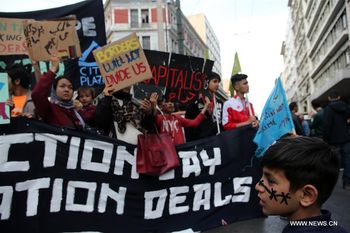The Refugee Solidarity Protests on March 17, 2018 were in response to the upcoming International Day for the Elimination of Racial Discrimination. The protests took place across 15 countries, with leftists, anti-fascists, solidarity activists and refugees all coming together to protest the rising sense of racism and anti-refugee sentiment that was sweeping across Europe. The protests came on the eve of the international day against racial discrimination and were a collective protest against rising tides of discrimination and racism that has been directed towards refugees throughout European countries. Protests from London to Athens, Madrid to Warsaw all centered on the theme of showcasing solidarity with refugees while also highlighting the rising racist sentiments gripping Europe that had let numerous right-wing governments gain power. Activists from all walks of lives came together to support refugees and no border activism across Europe.
The protests started across Europe on Saturday 17 March 2018, with more than a thousand people protesting against the failure of the refugee deals being conducted and the inability of the European Union to effectively help refugees.The protests ended at the main parliament buildings across their respective European cities with the message of urging national leaders to do more to help refugees by counteracting the growing anti-refugee sentiment by showcasing support for refugees in Europe.
There were numerous goals for the Refugee Solidarity March that happened across Europe. Particularly as the protest happened across many different EU nations, they all had particular aspects of the current situation of Refugees within their countries to protest on therefore the different goals across Europe are due to the variety of different countries and cultures that participated in the action. However, even though the goals differ slightly across the European continent, they all share a common them of showcasing solidarity with refugees in an environment characterized by growing anti-refugee and anti-migrant sentiment. One of the main goals was in fact a general protest against rising anti-refugee sentiment that was gripping Europe, numerous signs with slogans such as #WelcomeRefugees and #RespectRefugees were found at different protests across Europe and showcased the widespread support for refugee rights and human dignity. A large part of this goal was to encourage governments to take in more refugees than they had and lift the burden of southern European states such as Greece and Italy who had the responsibility of being first responders to the European refugee crisis. This particular sentiment was found across numerous Eastern and Central European countries such as Austria, Czech Republic and Poland who had refused to take in more refugees in fear of the over-exaggerated threats of violence that they had.
Another important goal of the movement was to producing alternative forms of factual knowledge on refugee issues and rights in Europe, dispelling many of the traditional fears that individuals have about refugees by giving refugees a platform to tell their stories and escape from persecution. The march was about truly uplifting refugee voices with refugees given he opportunity to give speeches in London and Paris so they could give personal perspectives on the refugee journey to the United Kingdom and France and the chance to showcase their own humanity and break down the stereotypes that refugees are a threat to the national security of countries. Furthermore, there was also a large emphasis during the march to guarantee that governments across Europe stick to the quotas of refugees that they promised they would take. Protestors in London placed particular emphasis on holding the UK government to its commitment to take in 20,000 refugees before 2020 and relocate more than 400 unaccompanied children currently living in squalid conditions in Northern France under the Dubs Scheme. Holding governments accountable was a critical goal of the protestors. With the rising tide of anti-refugee sentiment across Europe, many governments have been more than encouraged to enact strict refugee laws and ban quotas for taking in refugees. The protestors highlighted that not all individuals in European countries, support rising anti-refugee sentiment and that there is a strong and active group of people across Europe who are more than willing to hold governments accountable to their commitment to take in refugees.

Especially across Southern European states such as Greece, a main goal of the protest was opposition against the EU-Turkey deal which allows Greece to actively return "all new irregular migrants," while the EU aims to take more Syrian refugees directly from Turkey. The deal has accelerated Turkey's potential joining of the European Union and allowing European countries to ignore their Human Rights issues. Furthermore, the deal allows Greece to return refugees back to Turkey where they could face danger and especially after they had risked their lives by making the treacherous journey to Europe. Activists were protesting against the European Union for making this deal and compromising on its beliefs to provide safety and security to refugees in exchange for Turkish cooperation on refugees. Furthermore, it is allowing Turkey access into the European Union without necessarily addressing Turkish Human Rights abuses against its own citizens. The protest was against quick short term solutions to the refugee crisis that compromise Europe's ability to improve human rights in Turkey as well as compromising the dignity of refugees in Greece who after making the trip to Greece are deemed not worthy enough of resettlement.

Moreover, the protest highlighted another way that the public need to hold governments to account. Protestors marched against governments who have actively been creating regulations that attack refugee rights which are in clear violation of international standards of refugee protections. The protestors in Warsaw and Vienna exposed how their governments have been actively ignoring refugee rights and harming refugees who enter their country. By placing a spotlight onto this, protestors aimed to encourage governments to actively protect the rights of refugees in their country and combat the growing anti-refugee and Islamophobic sentiment that has swept across some European countries.

